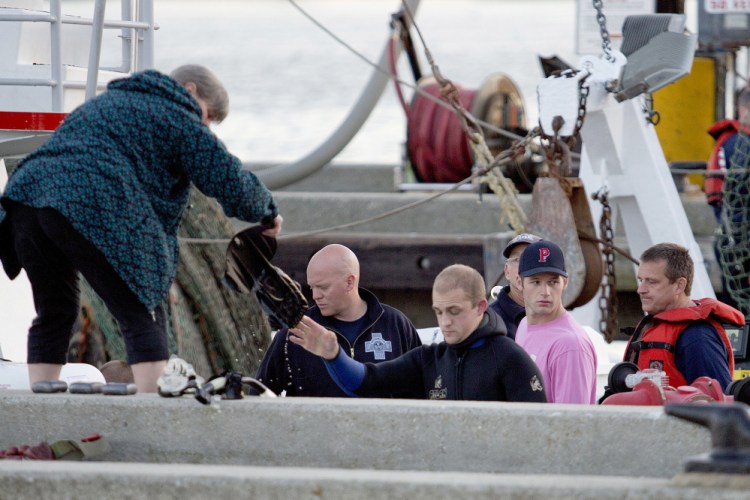The diver who died in Portland Harbor this week suffered injuries consistent with being hit by a spinning propeller, authorities said.
Dennis McGrath, 56, of Scarborough died Wednesday while removing rope that was tangled on the prop of the 65-foot fishing boat Jamie & Ashley. While he was working, the engine was running and at some point, the prop was engaged, injuring him, authorities said.
The state medical examiner did not release a cause of death, saying it is pending further study to rule out natural causes.
Police say the investigation into the death continues and they have reached no conclusion about exactly what happened, but they believe the incident was not intentional.
Meanwhile, a commercial divers association said Friday that basic safety guidelines that are customary in the industry apparently were not being followed and may have contributed to McGrath’s death.
McGrath died as he was removing rope from the prop and drive shaft of the Jamie & Ashley, which was moored at the Portland Fish Pier at 300 Commercial St. Boats occasionally get lines tangled in their propellers when they pass over lobster buoys.
Police divers recovered McGrath’s body in the area of the shaft and the prop, police said.
It’s not clear whether the person who engaged the prop was aware that McGrath was in the water.
Phil Newsum, executive director of the Association of Diving Contractors International, based in Houston, listed a number of safety standards that are common in the industry. He said working underwater on a vessel’s propeller should involve no fewer than three people – a supervisor, a primary diver and a tender who is a secondary diver if needed. That is the minimum standard required by the federal Occupational Safety and Health Administration, he said.
An OSHA spokeswoman said Friday that the agency covers most employees but does not cover self-employed workers. McGrath apparently was an independent contractor. However, the agency has been notified of the incident and is reviewing the case.
Another crucial safety step is what is known as lockout/tagout procedures, Newsum said.
“That’s where physically you lock the ability to go ahead and activate the vessel’s engines. That is something that is witnessed by the supervisor of the dive operation before any type of work is done,” Newsum said.
Many industries rely on lockout/tagout procedures to prevent what OSHA calls hazardous energy injuries – in which workers are hurt when electrical, mechanical, chemical and other forms of energy are accidentally released while someone is working on or near the equipment. In a commercial diving operation, the mechanism to activate the propeller would be physically locked out and only the supervisor of the operation and captain of the vessel would have a key, Newsum said.
Newsum also said that before anyone got in the water, a thorough hazards assessment would be conducted to determine what risks there were and what steps could be taken to reduce them.
“At a minimum, the vessel’s engineer and ship’s captain would sit in on that (assessment) and be fully aware there are dive operations taking place and that would need to be communicated to all hands,” he said.
The Jamie & Ashley is one of two fishing boats run by Eat Local Fish, according to the Portland company’s website. A telephone message left with the office Friday afternoon was not immediately returned.
Newsum said most of the commercial diving companies in his association are companies with many divers. They work on large boats and tugs, and also inspect dams, bridges and oil rigs.
Newsum said he is not surprised that some fishing boats might not employ a commercial diving company to remove line from a prop, because it would cost more than hiring a single scuba diver. But he said that can create a major liability.
“Just because it’s never happened before (for one vessel owner), doesn’t mean it isn’t one step away from happening and the worst result takes place, and it sounds like that’s what happened here,” he said.
The industry has two to three deaths each year doing commercial diving close to shore or on inland waterways and lakes, Newsum said. Commercial diving on the open ocean – such as on oil platforms – is much less frequent and has zero to one fatality a year, he said.
Send questions/comments to the editors.



Success. Please wait for the page to reload. If the page does not reload within 5 seconds, please refresh the page.
Enter your email and password to access comments.
Hi, to comment on stories you must . This profile is in addition to your subscription and website login.
Already have a commenting profile? .
Invalid username/password.
Please check your email to confirm and complete your registration.
Only subscribers are eligible to post comments. Please subscribe or login first for digital access. Here’s why.
Use the form below to reset your password. When you've submitted your account email, we will send an email with a reset code.